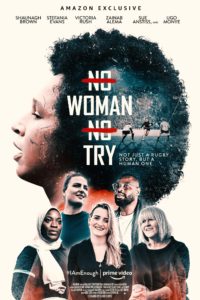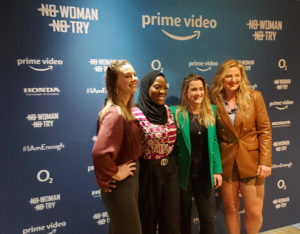No Woman No Try: How do you promote a sport?

You walk past the rugby pitches, and enter the clubhouse. You see the trophy-laden cabinet, the crests of the teams they have played.
Looking around Richmond Rugby Club, you realise you’re in a place steeped in rugby.
The clubhouse hosted the screening of No Woman No Try, a documentary exploring the world of women’s rugby.
The ‘new’ sports documentary
There have been many sports documentaries, but until recently they have mostly served two purposes.
One has been to tell story, with the relation to sports being as merely coincidental. Icarus is an Oscar-winning documentary investigating doping in sport, but the documentary revolves around the unravelling of a massive scandal happening in real time. It just so happens that this scandal takes place in sport.
The other purpose is to promote a player or a club. Whether it’s the All or Nothing Series, or the Last Dance, they ultimately serve to publicise one particular thing, be it Michael Jordan or Tottenham Hotspur.
Formula One’s Drive to Survive was unique because it served the purpose of promoting a sport in its entirety.
It didn’t just one follow one team or one driver, but the whole grid. It doesn’t just focus one singular story within the sport, but makes Formula One the story itself.
Drive to Survive has been massively successful in achieving its purpose. Formula One finally broke into the American market. Viewing figures for the 2021 season up by 40% from the season before and over 400,000 attending the US Grand Prix.
Other sports have tried to emulate this. Golf and Track Cycling have tried to join in on the success, with both sports making docu-series in the Drive to Survive model.
Documenting Women’s Rugby
Women’s rugby has similarities with the sports mentioned above. It contain likeable athletes, majority of whom are not recognised by the public, with fascinating stories that are yet to told.
If these athletes are branded right, and the stories told correctly, the sports have the potential to explode like Formula One.
However, for all the similarities one fundamental difference remains: women’s rugby is mostly amateur.
No Women No Try makes no attempt to hide that it is promoting women’s rugby.
The women rugby players that feature in No Woman No Try have other jobs. Stef Evans founded Ruggette RFC, a business that makes female rugby apparel. Zainab Alema is a nurse. Even Shaunagh Brown, the only one in the documentary with a professional contract, works as a firefighter.
The documentary interweaves these people together, their paths colliding at times (Evans and Brown’s teams face each other). It all builds up to Shaunagh Brown’s iconic speech when she’s awarded Player of the Match at the Premier 15s final.
Brown and Evans reveal the bullying they faced growing up as a result of not fitting into how people think women should look and act. All three women rugby players got into the sport after childhood.
The documentary captures where women’s rugby where it is right now, warts and all. The obstacles alongside the growth. The abuse with the praise.
Before the screening, director Victoria Rush explained how the documentary has its roots in the #IAmEmough and #ICare movements. The former was created by Rush in response to misogynist replies to a tweet announcing that the 2020 Women’s Six Nations being postponed.
The #IAmEnough Movement is for women to feel empowered, to be proud of ourselves exactly as we are.
We have come a long way to challenge stigma and stereotyping, but we have a long way to go. pic.twitter.com/PqYz6RW26h
— Victoria Rush (@victoriahrush) August 27, 2020
It is fitting then the documentary came out a day before the beginning of the 2022 Women’s Six Nations, given its own schedule separate from the men’s tournament.
It also has its own sponsor, in TikTok, for the first time. The sponsor being TikTok is important too. The social media company sees it involvement in sport as community-focused. In an interview, TikTok’s Sports Marketing Lead for Europe, Middle East and Africa Harley Johnson said:
“We saw an opportunity to capitalise on the rise of rugby content on TikTok and it’s amazing to see how the community has embraced the tournament so far.”
The #womensrugby hashtag now has over 100 million views on TikTok alone, and the #tiktokw6n hashtag has over 50 million.
Holding up a Mirror to the Sport

Rather than try to rebrand the sport like Netflix have done with Drive to Survive, TikTok sought to promote the sport as it is.
A similar attitude was present at the No Woman No Try screening. Afterwards, there was a Q&A with director Rush, Evans, and Alema. The questions asked were not centred on the documentary but about the future of the sport.
Their answers did not suggest repackaging how the sport is coverage, but simply calling for greater coverage. This was alluded to in the documentary itself, as former England international Ugo Monye discussed the importance of having male allies to the game.
Evans was adamant that it was not the sport that had the issue. In her opinion, with the sport growing at the rate it is, women’s rugby was a good investment to make, and it was only misogyny made investors think otherwise.
No Woman No Try is not unique in being a sports documentary that is trying to promote the sport its covers. However, while other documentaries seeks to project their sport in new light, a different lens, No Woman No Try holds up a mirror to women’s rugby.
Alongside the beauty in the sport, it shows its scars.
You can watch No Woman No Try on Amazon Prime here.
You can read more of the author’s work here.